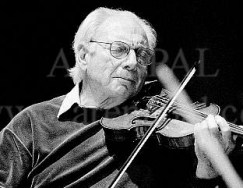“To be a musician in the service of music is not a job; it is a way of life.”
–Isaac Stern, violinist (The Musician’s Way, p. 299)
The music education community is swirling with talk about how best to prepare university-level students for modern-day careers. And for good reasons.
The music business is undergoing economic and technological upheaval, and many musicians and colleges are struggling to adapt.
Actually, some musicians appear to be thriving – those with entrepreneurial mindsets.
Entrepreneurial Musicians
Entrepreneurial musicians find multiple outlets for their talents. For them, loving music and making a living from music are one thing. Like Isaac Stern, they adopt ways of life that bring both fulfillment and income.
For example, a professional saxophonist I know combines teaching, performing, and recording with a penchant for technology; among other things, he’s developing music education apps for the iPhone.
Similarly, a Juilliard-trained violinist felt the tug of rock music and then built a career as a rock violinist while also presenting hundreds of school workshops and launching a successful line of electric violins.
In sum, entrepreneurial musicians don’t wait for job openings to appear. They make opportunities by forming broad artistic visions, expanding their skills, and generating demand for their work.
Some are self-employed and carve out distinct niches for themselves. Others hold traditional sorts of posts in orchestras, bands, universities, or schools, yet they extend their horizons beyond the conventional.
Music Schools and Entrepreneurship
From an educational standpoint, then, how can music colleges equip students to be high-level performers – with all of the intense practice and study that musical excellence requires – while also arming them with the entrepreneurial tools they need to succeed in the new economy in which traditional music jobs are scarce?
Although each school needs to answer that question for itself, taking into account its particular mission and resources, here are a few things that I believe undergraduate music programs would do well to consider.
- A required one-semester freshman seminar that enables students to be introduced to arts cultures and economies, draft preliminary artistic & career plans, establish e-portfolios, and learn about basic practice, performance, and collaborative skills during their first semester.
- Workshops, summer courses, and private consultations that allow students to develop their career plans, study case examples of music entrepreneurship, build up technology skills, assemble content for their websites, take on supervised projects, and access internships. Such educational offerings could be coordinated through an on-campus entrepreneurship center.
- A required upper-level career development/entrepreneurship course. Students would, among other things, refine their short and long-term objectives, gain insight into the music industry, amass literacy with business concepts, craft professional materials, and sharpen their networking, grant-writing, and technology chops.
- Student career-development grants. Students would submit proposals that could fund experimental productions, pay for conference/festival/competition attendance, support touring and community engagement projects, and help defray the costs of photography, recording sessions, mechanical licenses, website upgrades, and the like.
- A greater emphasis on creative thinking across the curriculum. Given that entrepreneurship grows from creativity, one of our primary educational missions should be to encourage creativity. For instance, we can incorporate composition exercises into music theory classes rather than focusing solely on analysis; we can sponsor competitions in which students submit proposals for ensemble concert programs and a winning proposal receives an award or is even performed; students in entrepreneurship courses could present competing business plans with the winners earning prizes.
- Added cooperation among faculty and administrators to allow room in curricula for students to ripen their entrepreneurial plans. All too often, music students are so overburdened – say, by being obliged to perform in several ensembles each semester – that they’re unable to pursue goals of individual interest. In effect, some students wind up serving the institutions where they study instead of the educational institutions serving the students’ needs. As a result, many students learn more about conformity than independent thinking. Let’s ensure that the college experience prepares students to flourish as self-directed musicians after they earn their degrees.
Of course, implementing these sorts of ideas would require substantial funding and planning. And I’m not suggesting that we should sacrifice high-quality education for some sort of ‘vocational training.’
I believe, however, that we must think expansively to transform applied music education at all levels.
Gerald Klickstein directs the Music Entrepreneurship and Career Center at the Peabody Institute, which launched in 2012. His book The Musician’s Way and its extensive companion website have drawn global praise for their insightful handling of the issues that today’s musicians face. Related posts on Klickstein’s blog can be found under the Entrepreneurship category.
© 2009 Gerald Klickstein


